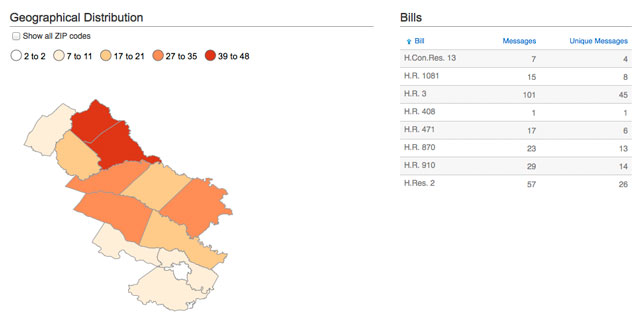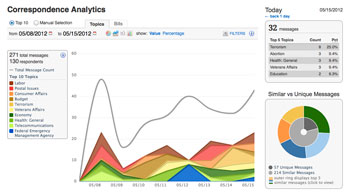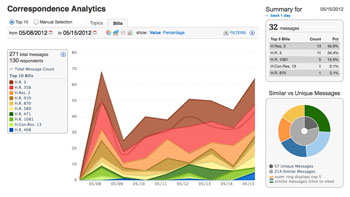If your elected officials suddenly seem less clueless, you might thank Beckmann and Hallaran, creators of Congressional analytics dashboard, Correlate.

After the inauguration of President Barack Obama, Dan Beckmann, a former Obama digital team strategist, stayed in D.C. to meet with Congressional staffers on both sides of the aisle. Beckmann, 32, had previously worked on developing and implementing new media strategy for ABC News and Current TV. Now, with all that he had learned about using technology on a political campaign, he was eager to try and use similar digital tools to increase the effectiveness in the governing process. As he met with staffers, Beckmann listened to what was and wasn’t working on Capitol Hill. Before long, a solution came into focus. “I didn’t go to D.C. to pitch a company. I thought they needed better social networks,” Beckmann says. Staffers told him that their most pressing need was a system that would help analyze and organize their correspondence. “For the next month I went through the Senate and House, both sides of the aisle, and they all agreed, some embarrassingly, that they had a huge problem,” Beckmann says.
So after those conversations, he and Tom Hallaran developed a program called Correlate, which allows the constant stream of correspondence from constituents to their elected representatives to be more efficiently managed. The program processes a single member of Congress’s constituent email, faxes, physical mail (via scan), and social media to produce real-time analytics on the issues that constituents are most concerned about. Correlate searches the correspondence for keywords and connects those keywords to specific pieces of legislation that are active in Congress. Over time, a machine-learning process comes to understand how people write messages, and identifies and then searches for key patterns in the correspondence. Then, the tool uses public government database information about active bills in Congress to associate bills with correspondence. The Correlate team has found this process to have approximately 85% accuracy. The program also filters correspondence coming from inside and outside the members' districts.

About This Series

Fast Company profiles the personalities behind the ideas that shake up business as usual. Discover more about these pioneers here.
“It takes a long time for the offices to get any understanding of what’s in their correspondence,” Beckmann says, noting that in the best-case scenario correspondence is organized and delivered to the relevant staffers two weeks after it has initially been received, and it's not very analytical. As a result, one of the most important aspects of our democracy--the ability for any citizen to write their Congressperson with their concerns--has become a slow, cumbersome, and often disregarded process.
Correlate allows the feedback to be viewed through a real-time dashboard. At any moment, a member of Congress or someone on his or her staff can pull up the tool to see how a particular piece of legislation is moving by the hour, day, week, month, or year. The dashboard also allows each office to focus in on patterns in specific cities and areas in their district.

 Beckmann is CEO and cofounder of IB5k, the company which built Correlate; Hallaran serves as cofounder and managing partner. In addition to building Correlate, IB5k has developed several other products, including a Facebook app called “Citizen Cosponsor” which allows average citizens to “like” a piece of legislations and interact with it throughout the process. They are also in the process of creating an updated system to manage all electronic communications within the House of Representatives.
Beckmann is CEO and cofounder of IB5k, the company which built Correlate; Hallaran serves as cofounder and managing partner. In addition to building Correlate, IB5k has developed several other products, including a Facebook app called “Citizen Cosponsor” which allows average citizens to “like” a piece of legislations and interact with it throughout the process. They are also in the process of creating an updated system to manage all electronic communications within the House of Representatives.Correlate’s government service costs under $500 a month per office. Beckman and Hallaran’s vision foresees a relatively low-priced product for government, supported by commercial applications of the same technology for private-sector companies. Correlate is already being used by some major consumer brands and their PR teams to follow consumer reactions to issues and campaigns.
Correlate doesn’t just process reactions to hot-button legislation, either. It also tracks everyday “casework” (i.e. immigration issues, military academy nominations, flag requests). Casework accounts for a significant portion of Congressional correspondence, and it is frequently time-sensitive, yet it is also a victim of backlogging.
Almost four years after those initial conversations, Correlate is active in 10 offices in the House including the leadership. Beckmann, Hallaran, and their team are pleased with this traction, and they anticipate greater adoption in the House and initial adoption in the Senate in the near future. Matt Lira, Director of New Media for House Majority Leader Eric Cantor, was one of the first staffers on the Hill to embrace Correlate. “There is a sense that technology when applied to the problems of our democracy can have a beneficial impact. In the legislative process, this correspondence problem is one of the main drivers of the feeling of disconnect between the public and the legislative institutions,” says Lira, who also worked with the IB5k team on the Citizen Cosponsor Facebook app. “We don’t want to just process this information, we want to make it actionable and useful to the legislative process.” On the productivity side, IB5k estimates that Correlate can eliminate at least half of a full-time position in a Congressional office. Lira says Correlate has allowed his office to reassign several staffers to more substantive work.
With the challenges in communication, Beckmann feels that constituent voices are being drowned out by lobbyists who have much more direct access to members of Congress and their staffs, “We have a huge problem with the power of special interests in the political system. This is a way that we can make the communication between a candidate or an office holder and their constituents stronger. It cuts out the need for special interests. It puts the rest of us on a level playing field. Now an average citizen can have just as loud a voice as a lobbyist.”
Hallaran and Beckmann believe that this model can be extended to all the branches of federal, state, and local governments. The team has already had conversations with the White House and international governments about implementing Correlate or a system like it. For Beckmann, Correlate is a continuation of excitement that captured so many people during the 2008 campaign. “People might remember what the energy in the political system was like back in 2008. In our office it’s still like that. People wanted better government and they knew it was possible then. Part of why we’re doing this to deliver on the promise that politics was going to change,” he says.
DIGITAL JUICE
No comments:
Post a Comment
Thank's!